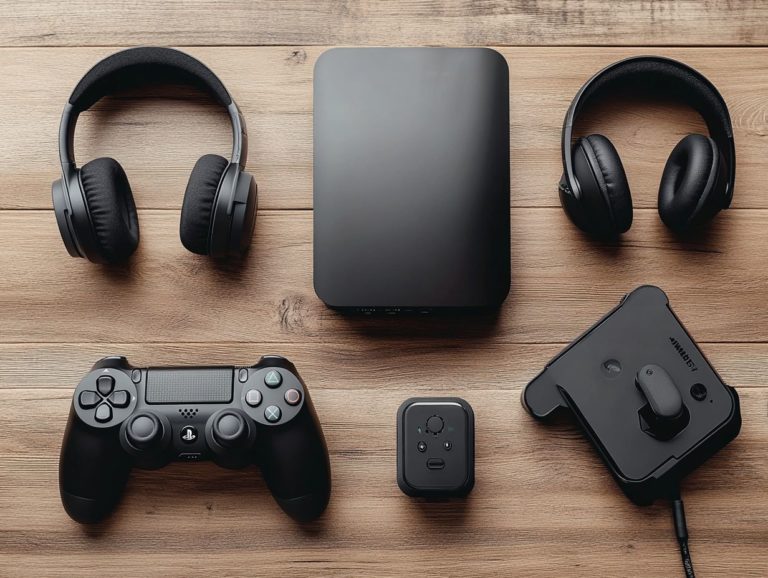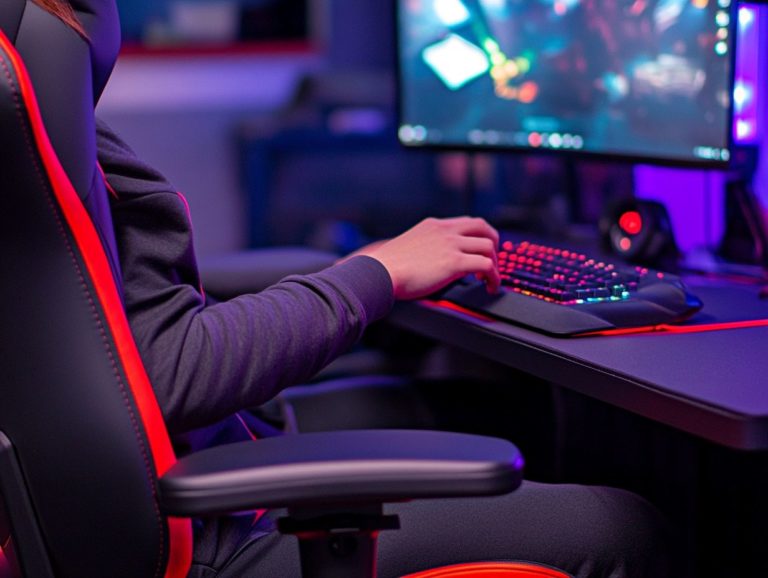what is gaming hardware?
In the ever-evolving world of gaming, grasping the hardware that powers your favorite experiences is absolutely essential.
Gaming hardware includes a variety of devices crafted to deliver immersive gameplay, ranging from powerful PCs and consoles to portable handhelds.
This article delves into the components that constitute gaming hardware, the various types available, and offers tips for selecting the perfect setup tailored to your needs.
You ll also find valuable insights on maintaining and upgrading your gear to ensure optimal performance.
Jump in and discover what you need to take your gaming to the next level!
Contents
Key Takeaways:
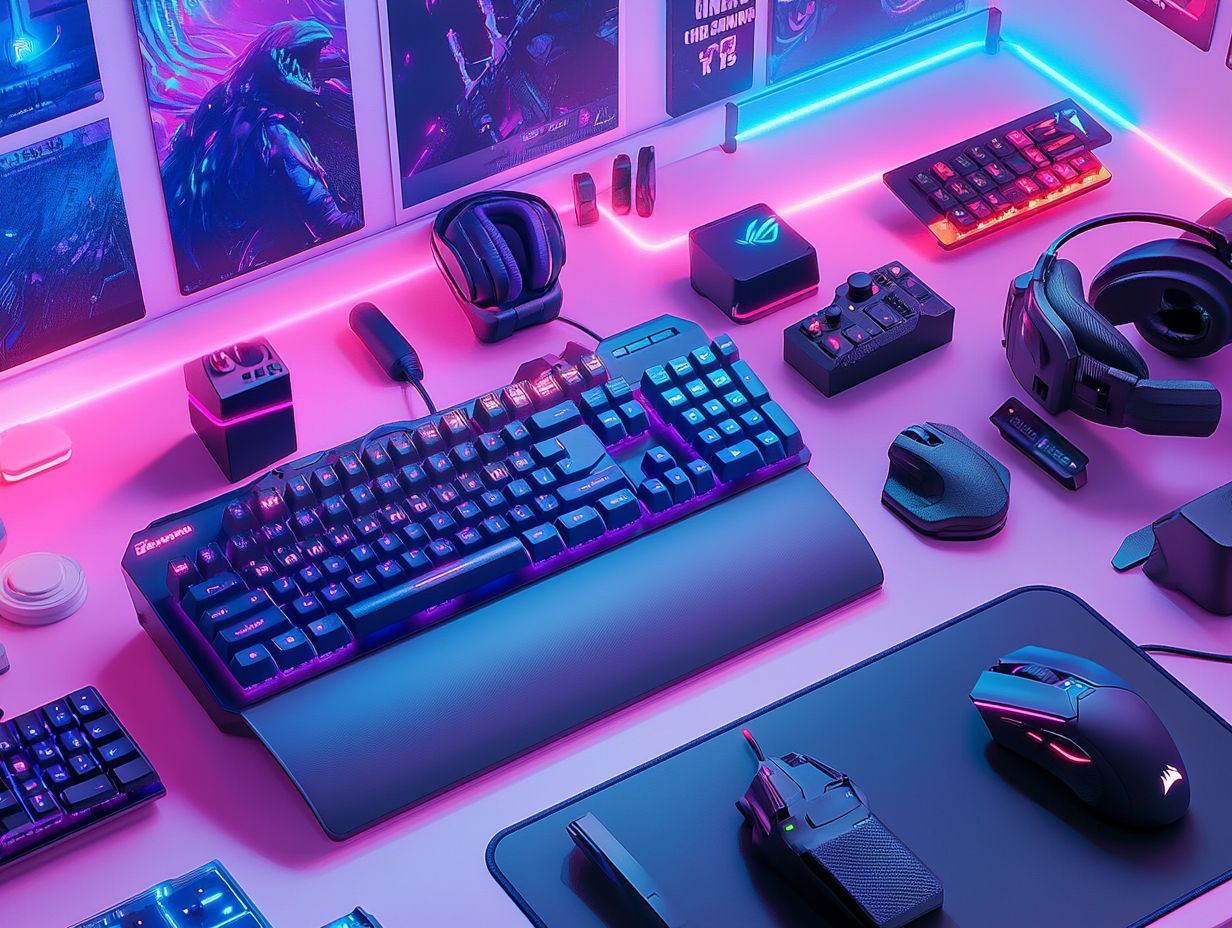
Gaming hardware refers to the physical components and devices used to play video games, including consoles, PCs, and handheld devices.
The main components include processors, graphics cards, memory, and storage, all of which work together to provide an immersive gaming experience.
When choosing gaming hardware, factors such as budget, gaming preferences, and future-proofing should be considered.
Maintenance and regular upgrades can also help improve performance and longevity.
Overview of Gaming Hardware
Gaming hardware consists of a variety of specialized components crafted to elevate your performance, efficiency, and overall experience as a gaming enthusiast.
Whether you re working with a powerful gaming computer or laptop, or looking into advanced components like graphics processing units (GPUs) and high core-count central processing units (CPUs), having the right setup can dramatically enhance frame rates, reduce game load times, and improve video game performance.
With a diverse array of peripherals at your disposal think gaming monitors and customizable RGB lighting you can create immersive environments that truly elevate your gaming experience.
As gaming technology advances, it’s important for all gamers to understand different hardware features.
Definition and Purpose
The term ‘gaming hardware’ encompasses the specialized components and peripherals that significantly elevate your gaming experience. This includes everything from gaming computers and PCs to a variety of accessories crafted specifically for gamers.
These elements work harmoniously to create an immersive environment that caters to both enthusiasts and casual players. For instance, high-performance graphics cards are crucial for delivering breathtaking visuals and smooth frame rates, making them critical for anyone looking into graphically intense titles.
Mechanical keyboards and gaming mice further enhance your precision and responsiveness, enabling you to execute commands with remarkable accuracy during competitive gameplay.
Meanwhile, headsets equipped with surround sound can transport you right into the game world, providing audio cues that profoundly influence your performance.
Together, these components and accessories not only boost your gaming performance but also cultivate a sense of community as you connect with fellow players, sharing setups and experiences that enhance the overall journey.
Components of Gaming Hardware
The components of your gaming hardware are crucial in defining the overall performance and capability of your gaming setup.
Key elements like the central processing unit (CPU), graphics processing unit (GPU), solid-state drive (SSD), and random access memory (RAM) each contribute uniquely to your gaming experience.
They impact everything from processing speed and load times to graphics rendering and multitasking efficiency.
Additionally, advanced gaming peripherals, such as high-refresh-rate monitors and customizable RGB lighting, elevate your gaming environment.
It s essential for you to select components that align perfectly with your performance needs and personal preferences, ensuring an optimal gaming experience.
Key Parts and Their Functions
Key components of gaming hardware include the CPU, GPU, RAM, and SSD. Each part plays a vital role that directly shapes your gaming experience and system performance.
Consider the CPU as the brain of your setup. It manages computations and tasks, while the GPU takes charge of rendering graphics, ensuring those visuals are smooth!
RAM is crucial for quick data access, essential for multitasking and maintaining those high frame rates during exciting gaming sessions.
Let s not forget the SSD, which dramatically cuts down load times. You can jump straight into your adventures without the maddening delays of traditional hard drives!
Understand how these components interact. For example, pairing a powerful GPU with inadequate RAM can create bottlenecks, stalling your overall performance.
Carefully selecting specifications helps boost frame rates, dive into VR gaming, and implement optimal cooling solutions to prevent overheating. All these elements lead to a seamless and truly enjoyable gaming experience.
Types of Gaming Hardware
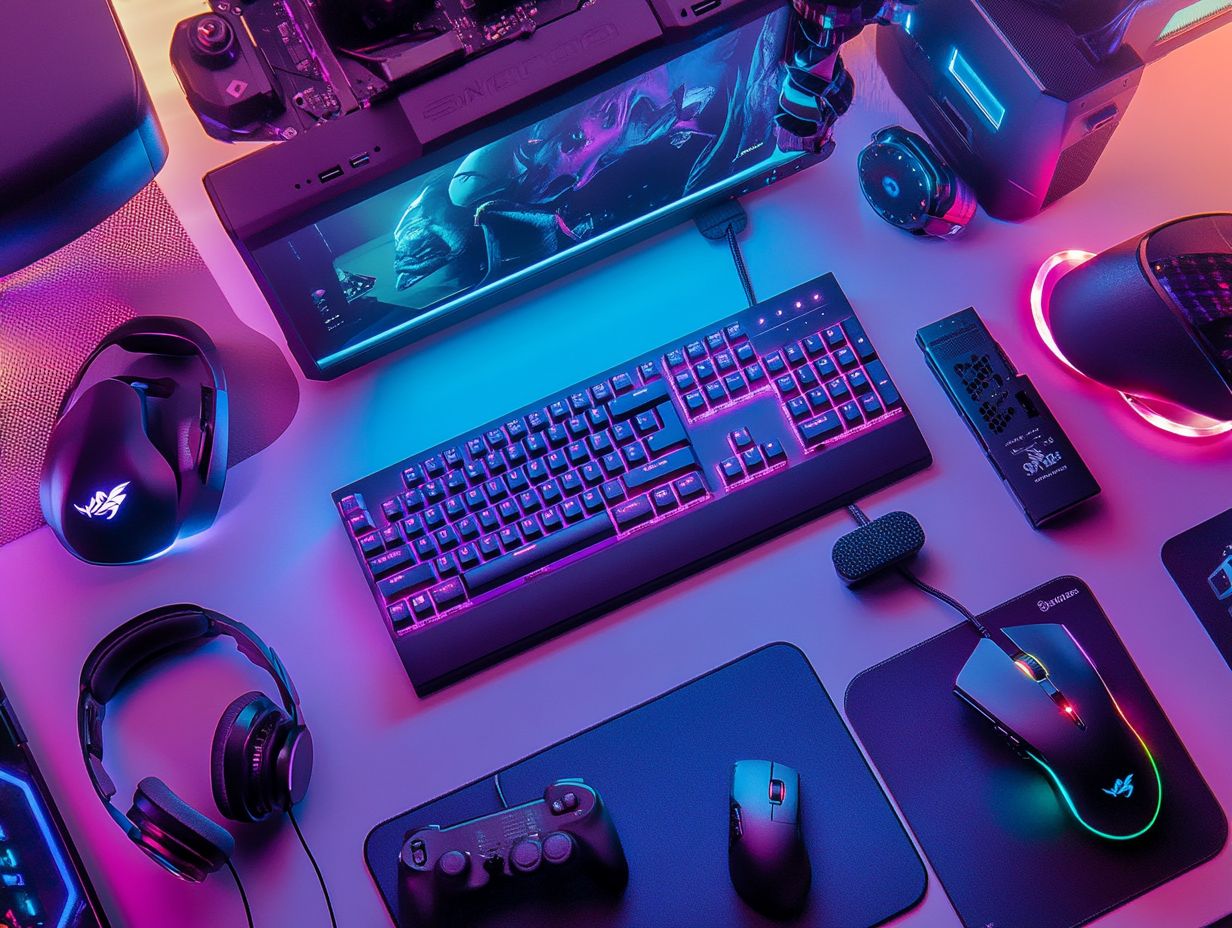
The diverse landscape of gaming hardware showcases a variety of options, including gaming computers, consoles, PCs, laptops, and handheld devices.
Each of these is meticulously crafted to cater to the unique demands and preferences of gamers like you!
Gaming Consoles
Gaming consoles, like the PlayStation and Xbox series, offer a dedicated platform for enjoying video games. They combine cutting-edge technology with a focus on accessibility and ease of use.
These devices come packed with powerful hardware. They feature advanced CPUs and GPUs that can handle even the most demanding games, delivering stunning graphics and smooth frame rates!
Beyond their impressive specs, gaming consoles lure you in with exclusive titles that provide unique experiences you won t find on other platforms. Their user interfaces are designed for simplicity, making navigation a breeze!
When evaluating performance, you might often compare these consoles to gaming PCs and laptops. In terms of game load times, consoles shine with optimized speeds.
While graphics quality is competitive, dedicated PC setups can easily outshine consoles with the right configurations. Online gaming capabilities are strong on both fronts, but PCs generally offer more customization and advanced features, elevating your gaming experience!
Gaming PCs
You can choose to build your gaming PC or buy a pre-assembled one. Gaming PCs are crafted specifically for the gaming enthusiast.
These systems boast powerful hardware components that offer superior performance and graphics capabilities compared to standard computers.
With a multitude of customization options at your fingertips, select hardware specifications that cater to your unique gaming preferences. Imagine choosing high-end graphics cards, ample RAM, and fast SSDs all tailored to enhance your gaming experience!
If you’re feeling adventurous, overclocking your CPU can significantly boost processing speeds. This allows you to push your system beyond manufacturer limits for smoother gameplay. Advanced cooling systems, like liquid cooling, ensure stable performance during intense gaming marathons!
Compared to consoles, gaming PCs offer a plethora of advantages such as enhanced graphics, higher frame rates, and effortless multitasking capabilities. This means you can dive into demanding titles while simultaneously streaming, chatting, and editing videos all without sacrificing performance!
Handheld Gaming Devices
Handheld gaming devices, such as the Nintendo Switch, provide a truly portable gaming experience. You can immerse yourself in your favorite titles wherever you go all without compromising on performance!
Equipped with impressive battery life, these devices ensure that your gaming sessions remain uninterrupted, whether you’re commuting or embarking on a long journey.
The graphics quality is remarkable, rivaling traditional consoles and delivering stunning visuals despite their compact form!
With a diverse game library that caters to various preferences, you can easily explore a range of genres right at your fingertips.
Unlike traditional gaming consoles and PCs, which often require a stationary setup, handheld devices offer the unique advantage of mobility. This flexibility makes them particularly appealing for those who may not have a dedicated gaming space or simply enjoy the thrill of spontaneous gaming sessions!
Choosing the Right Gaming Hardware
Selecting the right gaming hardware is crucial for better performance. This choice can elevate your gaming experience significantly.
There are many factors to consider. These can affect functionality, compatibility, and satisfaction.
Factors to Consider
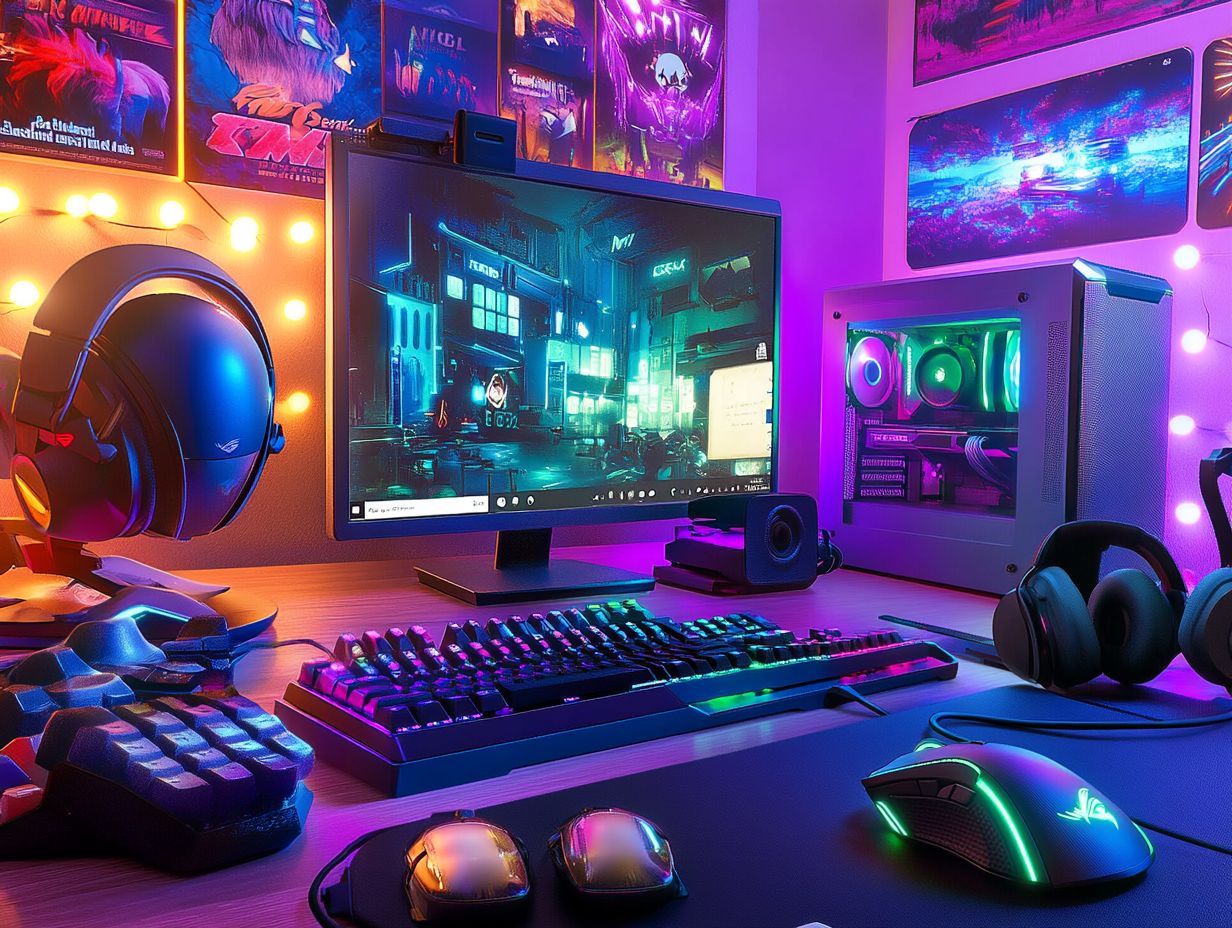
When selecting gaming hardware, several crucial factors come into play. Performance level, compatibility, and the gaming experience you desire are key considerations.
The performance level of your hardware directly influences how smoothly the game runs and how good it looks.
Ensuring compatibility with your existing gaming technology allows for seamless integration of your hardware setup. This spares you the frustration of connectivity issues or component mismatches.
The kind of gaming experience you seek competitive play, casual sessions, or immersive adventures determines the specifications you’ll need.
By balancing elements like the graphics card, processor, and RAM, you create an optimized setup that meets both current and future gaming demands. This enables a smooth, responsive experience tailored to your unique preferences.
Maintaining and Upgrading Gaming Hardware
Maintaining and upgrading your gaming hardware is essential for ensuring enduring performance and a consistently high-quality gaming experience.
Stay ahead in gaming by keeping your system up-to-date! This proactive approach keeps your system relevant as gaming technology evolves.
Tips for Longevity and Performance
To ensure the longevity and performance of your gaming hardware, implement various strategies that focus on maintaining durable components.
Creating a dust-free environment is essential. Invest in high-quality cooling systems and regularly monitor temperatures.
By dedicating time to proper cooling methods such as fans or water cooling solutions you can prevent overheating that can lead to hardware failures.
Regularly updating your software and drivers enhances compatibility and performance. It’s wise to routinely check and clean components like graphics cards and power supplies.
These proactive measures not only elevate your gaming experience but also significantly extend the lifespan of your equipment.
Frequently Asked Questions
What is gaming hardware?
Gaming hardware refers to the physical components or devices used to play video games. These can include consoles, controllers, keyboards, mice, and headsets.
What are the different types of gaming hardware?
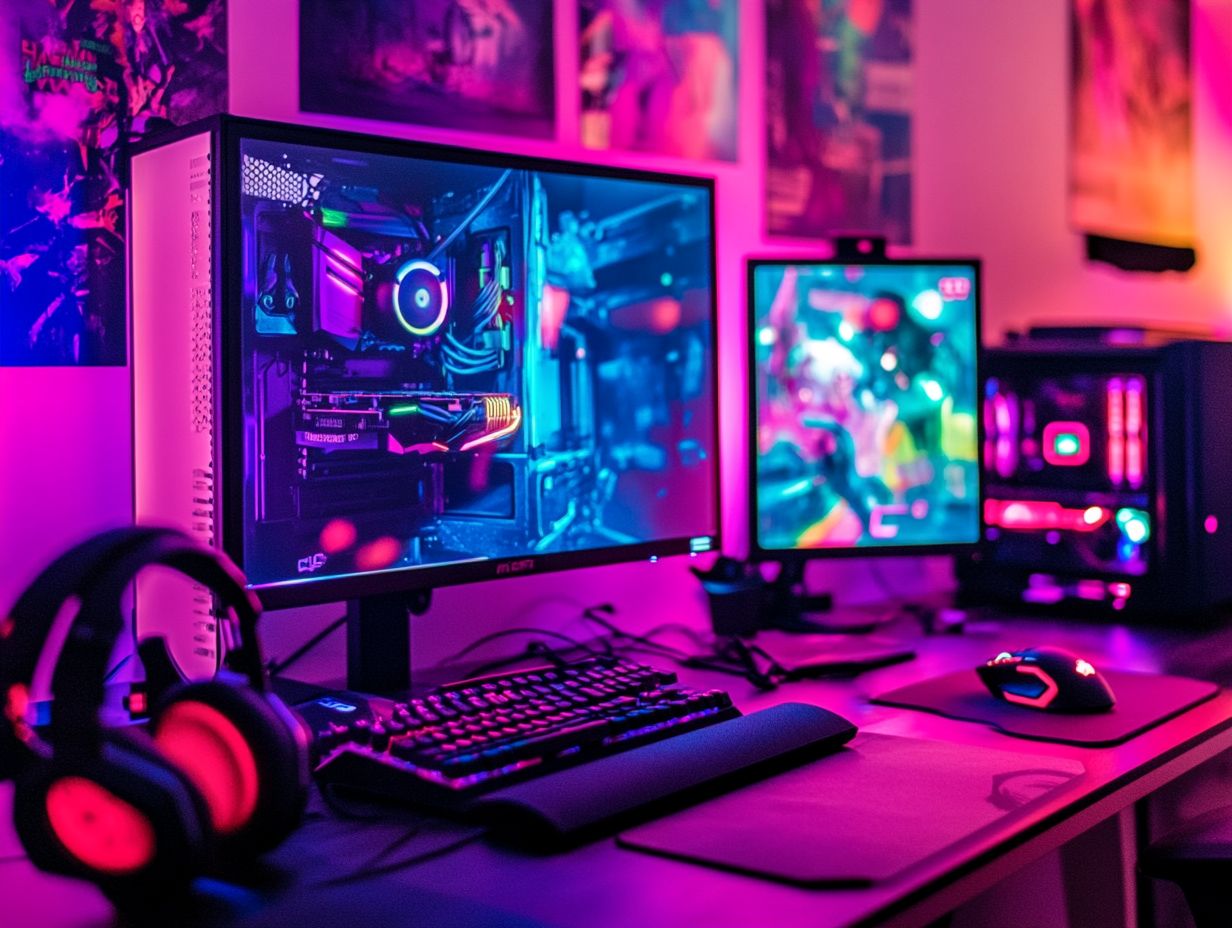
There are several types of gaming hardware, including consoles, PC components, and accessories. Consoles, such as the PlayStation or Xbox, are dedicated gaming devices usually connected to a TV.
PC components include the computer itself along with a graphics card, processor, and other necessary hardware. Accessories can include controllers, mice, keyboards, and headsets.
How important is gaming hardware for playing video games?
Gaming hardware is essential for playing video games, as it provides the necessary equipment to run and interact with the game. Without proper gaming hardware, it may be difficult or impossible to play certain games.
What should I consider when purchasing gaming hardware?
When looking to purchase gaming hardware, consider factors such as the type of games you will be playing, your budget, and the compatibility of the hardware with your current setup.
It’s also important to research and read reviews to ensure you are getting quality products.
Is gaming hardware only for serious gamers?
No, gaming hardware can be used by anyone who enjoys playing video games. While serious gamers may invest in high-end hardware for optimal performance, casual gamers can also benefit from having quality gaming hardware.
Have more questions? Reach out to our community or explore our guides!
Can gaming hardware be upgraded or replaced?
Yes, gaming hardware can be upgraded or replaced as needed. For example, you may choose to upgrade your graphics card for better visuals or swap out a broken controller.
Check compatibility before upgrading or replacing any hardware. Upgrading your gaming setup can significantly enhance your gaming experience!

